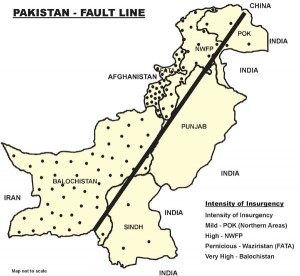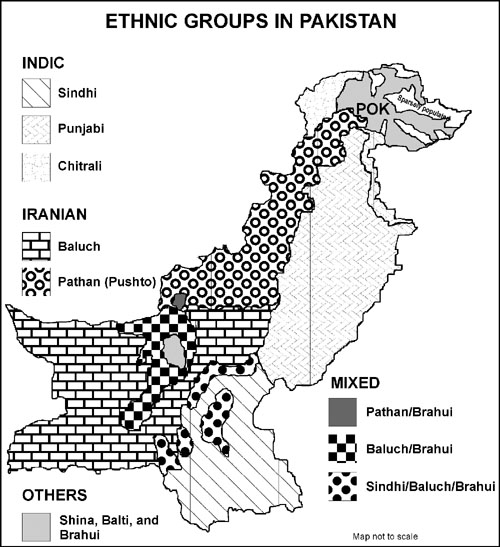It is also to be remembered that the Army and the ISI have fostered and closely worked with many militant groups in Kashmir and Afghanistan leading to growth of committed and die-hard following of such groups within these organisations. Their loyalty to their own parent organisations is no longer absolute.
Pursuit of mindless security is thus burdening Pakistan with ever larger problems.
The discourses on state and religion have run parallel to each other throughout the existence of Pakistan. They have alternated between discord and harmony with neither being able to establish supremacy over the other but with the former using the latter often to secure legitimacy. But in the process the latter has been acquiring greater and greater salience in the affairs of the state. The high point was reached during the Afghan wars of recent times when Jihad became the official state policy. Success in Jihad against the Soviets created the illusion that the same strategy would bring victory in Kashmir also.
Use of religion by the state enabled religious parties and clerics to dabble in politics and exercise influence far above their numbers. A coalition of these parties was also able to form provincial governments in Peshawar and Quetta and had representatives elected to the national assembly but the parties have not proved powerful enough to deflect the vast majority of general populace away from their traditional allegiance to Brelvi Sufi Islam to the more puritan Deobandi version despite Saudi, Salafi and Wahabi support. Their following can be estimated from their showing in general elections where they hardly mustered more than 11 per cent of the popular votes.
One can infer that those favouring imposition of Sharia in Pakistan would be around these numbers only. Radical Islam would not therefore have much chance in overwhelming the nation even as it leads to sectarianism in certain pockets. Radical Islam combined with the Jihadi spirit has metamorphosed into terrorism against the State when its coercive machinery is seen as cooperating with US or crushing ethnic nationalism in FATA but its reach, strength and power is in unable to shake the foundations of the State. The army therefore, takes minimal action against terrorism and its perpetrators, preferring not to queer the pitch. Civil Society movements such as the Lawyers’ agitations during Musharraf era and also against Zardari for upholding the sanctity of judicial offices also seem to suggest that the secular principle is not entirely dead in Pakistan.
Success in Jihad against the Soviets created the illusion that the same strategy would bring victory in Kashmir also.
Yet Pakistan will not remain unaffected if Islamic revolutions sweep its neighbourhood and the Arab world. A far reaching geo-political consequence will be high profile antagonism between the Sunnis and Shias everywhere in the Islamic world. Ayatullah Khomeini’s advent to power in 1979 in Iran was the first real Islamic revolution of recent times. Its influence was deeply felt in Pakistan in the shape of heightened sectarianism. The Iranian revolution had facilitated the activities of Tehrik-i-Nifaz-i-Fiqh-i-Zafaria (Movement for the implementation of Shiite religious law) which were stoutly countered by Sunni extremist groups like Sipah-e-Sahaba and Laskhar-e-Jhangvi. The latter want the Shias declared non-Muslims – a sentiment that had found a favourable echo with the Taliban in Afghanistan. Such Sunni groups are Saudi surrogates.
An unprecedented rise in sectarianism would be on the cards if the war between Sunnis and Shias escalates elsewhere. The Pakistani state will have a difficult time in controlling it as its intelligence apparatus is heavily allied with the Sunni militant groups. This close alliance and the deep-seated strategic desire to see the Taliban’s rise again in Afghanistan is responsible for the enduring Pakistani support to the Haqqani network in North Waziristan and Taliban’s Emir-ul-Momeen Omar’s Quetta Shura. If and when Taliban re-emerge in a commanding position in Afghanistan, they will turn out to be a destabilising factor for the sectarian upheaval in Pakistan. Its hapless civil society will likely become a bigger victim of the sectarian fissures than it is today. The militant groups which are already a part and parcel of the Pakistani social fabric will then assume much bigger profiles. With such developments, enlightened moderation, once Musharraf’s dream stands no chance.
Even as the civil society in Pakistan by and large abhors fundamentalism and Jihad, the current drift towards greater conservatism and elimination of Brelvi Sufi influence will go on as indeed has been happening in the past decades due to official patronage. Islam in Pakistan today is way away from fanaticism but it is also true that it harbours more fanatics today than ever before.
 India remains perpetually on the cross-wires of the Pakistani military machine. The sense of hostility against India in Pakistan is a product of Muslim antagonism towards Hindu philosophy and culture existing for centuries. It is, therefore, a mistake to attribute the constant stand-off between the two countries as arising out of events after partition. The disproportionate strength and size, economy and demography of India are all factors that create immoderate fears about survivability in Pakistan and add extra dimensions to the existential mistrust. Those who postulate that such primordial paranoia can be cured through dialogue are really living in a world of self-created delusion.
India remains perpetually on the cross-wires of the Pakistani military machine. The sense of hostility against India in Pakistan is a product of Muslim antagonism towards Hindu philosophy and culture existing for centuries. It is, therefore, a mistake to attribute the constant stand-off between the two countries as arising out of events after partition. The disproportionate strength and size, economy and demography of India are all factors that create immoderate fears about survivability in Pakistan and add extra dimensions to the existential mistrust. Those who postulate that such primordial paranoia can be cured through dialogue are really living in a world of self-created delusion.
There were indeed a few occasions in the past for a break through. During Rajiv Gandhi’s tenure as Prime Minister, a military line of disengagement along the Saltoro range and a reduction in the overall strength of troops had actually been mutually agreed. During General Musharraf’s tenure, as President, barring the issue of sovereignty to be exercised over Jammu & Kashmir, broad informal agreements had been worked out on maintaining territorial status quo in the state , soft borders and cross-border membership of some civilian institutions but eventually all such ideas were shot down by the Pakistani side because of military pressure. It appears as if the Pakistani military, bureaucracy and political elite are afraid of peace with India.
In the past, the Armed Forces in Pakistan have been a law unto themselves…
No other conclusion is possible. The list of contentious disputes between the two countries has been expanded now to include water issues, India’s presence in Afghanistan and India’s alleged support to the Baluchi freedom fighters and Pakistani Taliban in the borderlands across the Durand Line. Pakistan is continually increasing its nuclear pile even though it is a universally acceptable doctrine that nuclear weapons have a role only for deterrence. Pakistan’s opposition to the Fissile Material Control Treaty is born out of its anxiety to ensure that its nuclear weapons programme is not hampered.
The strength of the Pakistani Armed Forces cannot therefore be reduced. Their credo of Iman (Faith), Taqwa (Piety) and Jihad fi Sabih Allah (Jihad for the sake of Allah) cannot be changed to a more moderate slogan. They will continue to seek inspiration from the doctrines of Islam and will effectively remain the most powerful political influence paddling group in Pakistan always having the last word on the nature of governance in Pakistan and on crucial policies. They may shy away from open interference for now but in the final analysis, their will will always prevail in Pakistan. It will be Pakistan’s fate to linger on as a crisis state as the needs of strategic national security as assessed by the military structure will continue to be held paramount over everything else.
The dialogue ritual can be held only with the Pakistani diplomats and the civil authority who actually have no control over the military and who are usually ignored by the latter. How can it produce any substantial result? Can one ever hope that Pakistan move against Hafiz Mohd Said and the Haqqani network? They are counted as assets of the Pakistani security architecture and hence are an invaluable part of the national security infrastructure. And yet, to keep the line of communication open, it is advisable to keep the ritual alive.





